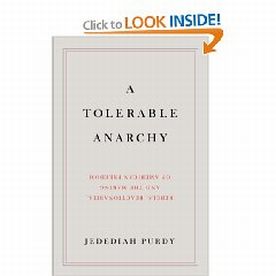The Left-wing Fantasy
From The New Criterion“The Tory Party today is united by its fiscal conservatism whereas Republicanism today is principally concerned with social conservatism.” So wrote one James Kanagasooriam in the London Daily Telegraph early in the New Year. He was attempting to explain how it was that, in his view, “British and American conservatives are speaking a different language,” though the differences are pretty obvious and have been around for a long time. Much more interesting are the similarities — or at least they would have been if they hadn’t been obscured by the blaze of hostile publicity which accompanied former Senator Rick Santorum’s strong showing in the Iowa caucuses a few days earlier. Mr Kanagasooriam, who disarmingly described himself as “a Westminster anorak with an interest in all things political” may never have spoken to an actual American conservative, but his anorak — a sort of hooded winter jacket that Britons metonymically associate with nerdishness, rather as Americans do pocket-protectors — must have served as an echo chamber for the American media who had their own reasons for portraying the opposition to President Obama as being “principally concerned with social conservatism.”
To be fair, this impression was not created ex nihilo. The Republican candidates were, like most Republicans, to a greater (Mr Santorum) or lesser (Mitt Romney) degree social conservatives and self-described Christians. So, ostensibly, is Mr Obama. But few if any of them would have based their challenge to the President on the so-called “social issues” had they not collectively made a devil’s bargain with the media for the free publicity of a seemingly endless series of television debates among themselves, beginning a year and a half before the election, in return for which the media got to set the Republican agenda on the candidates’ behalf. Most of them were smart enough to know that, in practice, there can be few things less relevant to a politician in office than his moral and religious beliefs. The American system offers almost no opportunity to him to “impose” such beliefs on others. But there is a large bloc of voters who like to have their own religious beliefs flattered by candidates for the nation’s highest office and vote accordingly. For their sake, then, the candidates have to pretend to be intent on outlawing abortion or reining in the judiciary when they know that there is virtually no chance of their doing anything of the kind.
The media surely know this as well as the candidates themselves. If they were genuinely interested in reporting the political contest, they would treat such matters as the symbolic issues they are — interesting to a significant number of strong partisans on both sides but practically irrelevant to the prospective performance in office of those seeking election. But the media are not interested in reporting the political contest. Dominated as they are by Democratic partisans, they use the professed sexual morality of Republicans as a wedge issue in order to portray them as “extremists.” Temperamental utopians themselves, they imagine or pretend to imagine that those with traditional views of sexual morality are intent on setting up an ideal state in which such morality is written into the law and zealously enforced on a reluctant population that, like Shakespeare’s Vienna in Measure for Measure, has grown used to sexual laxity — with no doubt similar results. This ideal state they often speak of as the Republican “theocracy,” which is the great straw man of this political season and very useful for distracting people’s attention from their real political concerns as measured by pollsters, which are mostly economic and which are not so favorable to the incumbent.
The public may, indeed, be catching on to the trick. During the first debate after the Iowa result, George Stephanopoulos was booed by a New Hampshire audience for pursuing an absurd hypothetical question about the legal status of non-existent state efforts to ban contraception. “You’re asking — given the fact that there’s no state that wants to do so, and I don’t know of any candidate that wants to do so — you’re asking could it constitutionally be done?” asked candidate Mitt Romney incredulously. The Associated Press reported that he had “tried to avoid the question.” As he has done before in these debates, candidate Newt Gingrich most memorably dragged the media bias out into the open. In response to a question about gay adoption he said:
You don’t hear the opposite question asked. . .Should the Catholic Church be forced to close its adoption services in Massachusetts because it won’t accept gay couples, which is exactly what the state has done? Should the Catholic Church be driven out of providing charitable services in the District of Columbia because it won’t give in to secular bigotry? Should the Catholic Church find itself discriminated against by the Obama administration on key delivery of services because of the bias and the bigotry of the administration?”
To Mr Stephanopoulos and the other media-appointed moderators, however, this kind of point is the irrelevance — because it doesn’t advance the story of Republican religious “extremism.” Therefore, they keep seeking occasions to convey the impression the media wishes to convey of a collection of angry fanatics in a divided and fractious Republican party said to be badly split between “extreme” conservatives and dubious moderates.
See, for instance, the editorial from The Guardian which claimed that the shambolic (in its view) Republican field was “a fair reflection of a party so divided, so dominated by ideological demons, so beholden to the dangerous concept of fundamental truth, that they fear each other more than they do the Democrats.” Wait a minute. “So beholden to the dangerous concept of fundamental truth?” What a lot of questions are being begged there! But of course the point is just that anyone stupid enough to believe in revealed religion, which all the Republican field claim to do, is ipso facto not to be trusted with presidential power, even though every previous president, including the current one, has professed such a belief. Who, you may ask, is being “extreme” here? The cultural ground has been well-prepared for the media’s presentation of almost any profession of Christian belief as extreme and out of the mainstream — “really weird” as Eugene Robinson of The Washington Post described Mr Santorum’s decision to take the lifeless body of a son who died only two hours after birth home so that his other children could grieve properly. Mr Robinson subsequently apologized for his own offense, but not for writing that Mr Santorum’s religious beliefs were “offensive” and “extreme.”
Such a characterization of them must lose a little of its punch now that it has become offensive to many even to mention God or religion. So when the quarterback for the professional football Denver Broncos, Tim Tebow, made it a habit on taking over the starting job this year to kneel down and pray on the field, it became a media cause cél bre — particularly when the reinvigorated Broncos, perhaps coincidentally, began winning their games unexpectedly. Winner of the 2007 Heisman trophy as a sophomore at the University of Florida, Mr Tebow was known for putting references to Bible chapters and verses on his eye-blacking when he was taking the Gators to two national championships. Now, to his 600,000 followers on Twitter, he regularly signs off with “GB2,” meaning “God Bless and Go Broncos.” Such ostentatious religiosity makes him, in the view of Tom Krattenmaker, author of Onward Christian Athletes, “the flashpoint for this ongoing argument in our country about the role of evangelical Christianity” — an argument that most of Mr Tebow’s supporters are unlikely ever to have heard of. “There are a lot of fans out there who believe that Tim Tebow may be the Second Coming of Jesus Christ,” wrote Sally Quinn in the Washington Post blogs. “I’m serious.”
She undoubtedly was serious, too, but I think it safe to say that the people who allegedly believed Mr Tebow was the Second Coming of Jesus Christ were not. If it were anyone else you’d assume Ms Quinn was affecting not to get the joke, but she quite possibly didn’t get it. Either way, she reminds us of how newsworthy the journalistic culture always considers anything that can be represented as craziness or eccentricity on the part of religious believers. Or, of course, their hypocrisy and wickedness, wherever it may be found. To The New York Times, the pedophilia scandals of the 1990s in the Catholic Church remain an evergreen source of inspiration. Here, for instance, is that paper’s lead to a news item about the Archbishop of New York’s being made a cardinal. “It is not a good time for the Roman Catholic Church in America,” the Times intoned, “but Archbishop Timothy M. Dolan, the cardinal-designate of New York, has made it his mission to remind people that there is more to the church than scandal.”
Anyone not immersed in the media culture will hardly need any reminding that there is more to the church than scandal, nor will any reader of the Times itself need any reminding of the scandal. But the paper continues to do its bit to keep scandal ever in the forefront of non-Catholic consciousness of the church — which is one reason why Jay Leno, for example, never mentions the church without some scandalous innuendo. This would hardly be possible for him or the many other comedians and commentators like him without the media’s all but exclusive attention to such scandals. That, in turn, provides the occasion to mention the many ways in which Archbishop Dolan in particular and the Church in general do not see eye-to-eye with The New York Times. Even now, the article goes on,
two and a half years after Archbishop Dolan arrived at the helm of the New York Archdiocese, his personality is not well known outside of religious circles. And the question remains whether this distracted, liberal, scandal-weary city is willing to listen to a conservative voice even as entertaining as his. Since arriving in New York from Milwaukee, Archbishop Dolan, who was raised in Ballwin, Mo., has most often caught the public’s attention as the traditional unyielding Catholic voice of “no” — to same-sex marriage, to abortion and to sex education in public schools.
Doubtless modesty forbids the Times to mention its own role in catching the public’s attention for this particular aspect of the Church’s moral teachings, but we may now take for granted that the media’s coverage of the story has become part of the story, as much in religious as in political contexts.
It would be remiss of me not to mention the role of the late Christopher Hitchens in bringing the culture to the point of regarding any religious belief as bordering on lunacy. His death just before Christmas was accompanied by an unprecedented outpouring of affectionate tributes from friends and ideological foes alike. Like me, many of his friends were ideological foes. But the few dissenting voices from the general adulation were mostly on the left and did not include any — at least not any that I read — who were prepared to mention the most unfortunate consequence of his anti-religious crusade, which was to obscure what would otherwise have been the obvious differences between religious conservatism in the Christian (or post-Christian) and the Islamic worlds. Without the efforts of Hitchens and his anti-religious allies, it is hard to imagine that Andrew Sullivan would have had much success in promoting his neologism, “Christianist” — formed on the analogy of “Islamicist” — to describe those, among others, who hold traditional Christian views about sexual morality.
For him as for the media more generally now, such views are every bit as scandalous as they imagine their favorite forms of sexual misbehavior would have been once upon a time. From old-fashioned sexual morality, it is an easy leap for left-leaning polemicists like Mr Sullivan to calling Mr Santorum “a loyal Vatican foot soldier” or “one of the looser screws” on the wheels of the Republican wagon — someone whose inability to find it in the Constitution means that he “finds the whole idea of a right to individual privacy absurd.” Likewise, John Nichols, blogging for The Nation wrote that Mr Santorum “has no qualms about rewriting the Constitution as a social-conservative manifesto.” Whether or not he would have any qualms, he would not, even as president, have any power to re-write the Constitution as a social-conservative manifesto, assuming there could be such a thing, and so has not proposed to do so. That at various times he has expressed support for constitutional amendments very unlikely ever to pass, circumventing Roe v. Wade or in defense of traditional marriage, does not make the idea, expressed with affected horror, of a re-written Constitution any less of a left-wing fantasy foisted upon him on the basis of the media’s never-ending barrage of hypotheticals designed to expose what they claim to regard as his outlandish religious views.
In addition, Senator Santorum’s proposals for a balanced budget amendment are in Mr Nichols’s view “code for dismantling Social Security, Medicare, Medicaid and other social programs that the Christian right would like to see replaced with ‘faith-based initiatives’,” while any attempt to claim back for the elected branches of government some of the power lately usurped by the judiciary demonstrate to Mr Nichols’s satisfaction that the former Senator is, apart from anything else, a fraud.
He is not a ‘constitutional conservative.’ And he is certainly not a proponent of the principle, advanced by the founders, that the United States should be governed by the rule of law, not the rule of men. Quite the opposite. For Santorum, it is the rule of men — particularly right-wing evangelical men — that supersedes the rule of law as outlined in the Constitution.
To call the former Senator crazy, then, is obviously to be too kind to him. At a slightly more high-brow level, Mark Lilla didn’t mention Rick Santorum but seems to have had him in mind as well as Glenn Beck and Ann Coulter (who, by the way, supports Mr Romney) when he wrote in The New York Review of Books of a new strain of what he called “apocalypticism” among religious conservatives in America today.
The first neoconservatives were disappointed liberals like Irving Kristol and Nathan Glazer, who saw the failures of a large number of Great Society programs to deliver on the unrealistic expectations of its architects, and consequently began to appreciate the wisdom of certain conservative assumptions about human nature and politics. Kristol’s famous quip that neoconservatives were liberals who’d been mugged by reality captured the original temperament. Sometime in the Eighties, though, neoconservative thinking took on a darker hue. The big question was no longer how to adapt liberal aspirations to the limits of politics, but how to undo the cultural revolution of the Sixties that, in their eyes, had destabilized the family, popularized drug use, made pornography widely available, and encouraged public incivility. In other words, how to undo history. At first, neoconservatives writing in publications like Commentary and The Public Interest (which I once helped to edit) portrayed themselves as standing with “ordinary Americans” against the “adversary culture of intellectuals,” and to that end promoted “family values” and religious beliefs they did not necessarily share, but thought socially useful. Yet by the Nineties, when it became apparent that lots of ordinary Americans had adjusted to the cultural changes, neoconservatives began predicting the End Times, and once-sober writers like Gertrude Himmelfarb and Robert Bork started publishing books with titles like On Looking into the Abyss and Slouching Towards Gomorrah.
“In other words, how to undo history.” That would be the same history that President Obama said was on the side of the Iranian freedom demonstrators in 2009 — and that has been decidedly niggardly with its favors to them since. It’s also the history that Harry Reid presumably had in mind when he said that the Republican opponents of the Patient Protection and Affordable Care Act were on the wrong side of it. Progressivist historicism, inherited from Marxism, implicitly believes that “history” has a direction and a purpose, as well as a side, which it is futile for conservatives and other “reactionaries” to try to “undo.” The progressive version is rather Leibnitzian than Hegelian and comes close to claiming that whatever is, is right — a point of view which it is obviously much easier to adopt when “history” seems to be moving in your preferred direction, as American cultural history has in the progressive one over the last half century. Mr Lilla’s idea of “the End Times” clearly owes more to this left-over Marxism than it does to a Christian millenarianism which is professed neither by Mr Bork nor by the Jewish Miss Himmelfarb — who, as he does not mention, is his former mother-in-law.
But how easily, with the help of a bit of paraphrase and a certain haziness in the secular mind about the meanings of words like “evangelical” or “apocalypticism,” an “extremist” may be manufactured for the readers of The Nation or the New York Review to throw rocks at. Those on the left may or may not believe in this right-wing bugbear they are at such pains to create, but they undoubtedly have a very strong sense of the convenience of having such a bugbear to attack when people might otherwise want to talk about subjects like jobs, economic growth or government fiscal policy that the left would prefer to avoid during this election season. Left-wing utopianism is so much the default position of the media that it is easy for such writers to pretend that the most important thing about a candidate is how, if he were absolute dictator, he would fashion an ideal society. By treating Mr Santorum (or anybody else) as if he were seeking election to the presidency in order to do only things that the president cannot do, the media and their left-wing allies hope they will be able to hold together a bare majority on behalf of President Obama — a majority not of those who approve of him, which he is most unlikely to have, but of those who are opposed to this left wing fantasy of a right-wing theocracy. And how glad we will all be, amidst our economic doldrums and our fiscal ruin, to have dodged that bullet.
Discover more from James Bowman
Subscribe to get the latest posts to your email.







